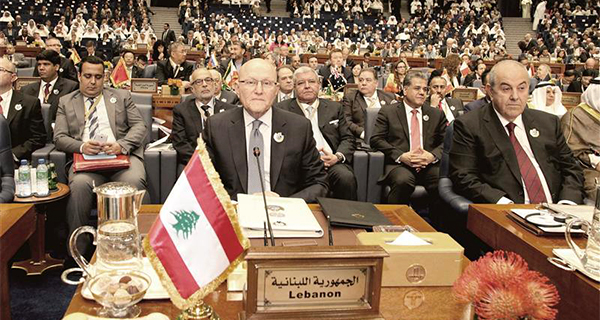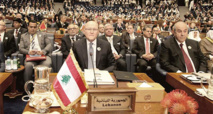Almost a million Syrian refugees are hosted in Lebanon, according to UN figures. The country's population in 2010, before the conflict broke out, was about 4.3 million according to the World Bank.
French President Emmanuel Macron said the pledges showed how the international community valued Lebanon's political and religious pluralism as a model for the region.
"Your mobilization marks the shared conviction of the international community that a strong, determined, preserved, encouraged and supported Lebanon is absolutely essential to patiently construct the conditions for restoring peace in the Middle East," Macron told participants.
"In total, the conference has enabled... the mobilization of slightly more than 11 billion [dollars] in public commitments," he announced.
The conference came a month ahead of parliamentary elections in Lebanon - the first since 2009.
Lebanese Prime Minister Saad Hariri earlier told the conference that his government had an ambitious programme to reform governance and diversify Lebanon's economy, but it needed the support of the international community.
The conference is one of a series of three: A meeting in Rome in February pledged more than 450 million euros (550 million dollars) to support the Lebanese army, while a third, scheduled for Brussels later this month, will focus on helping the country host the Syrian refugees.
"We are doing a public service for the international community," Hariri said of the refugees.
Foreign aid could not just be limited to humanitarian issues, though, French Foreign Minister Jean-Yves Le Drian said.
"Obviously, the entire economic fabric, especially infrastructure and public services, are under stress and need our support," he said.
Lebanon's stability depended on "combined action," Le Drian argued: "Reforms - the Lebanese action; and the international community's action: support."
Hariri noted that Lebanon's economic growth had crashed from an average 8 per cent before the Syrian conflict broke out in 2011 to barely 1 per cent in subsequent years.
The role of the Shiite political and military movement Hezbollah both at home and in the Syrian conflict has also added to tensions in the country.
Macron brokered a deal to get Hariri home to Lebanon late last year after the prime minister made a surprise resignation announcement from the Saudi capital, Riyadh.
Other Lebanese politicians argued that he was being held under duress there. Many suspected Saudi Arabia was seeking to exert pressure against Hezbollah, an ally of rival regional power Iran.
Lebanon is governed by a national unity government that includes Christian, Sunni Muslim and Shiite Muslim parties, some leaning towards Syria and Iran and others, like Hariri, closer to Saudi Arabia.
Also on Friday, Macron spoke to Russian President Vladimir Putin, the Elysee said.
Macron told Putin Russia should use all its influence with its ally, the government of Syrian President Bashar al-Assad, to ensure an end to the recent escalation in the Syrian conflict.
A recent government offensive has captured most of the rebel-held eastern Ghouta region on the outskirts of Damascus. More than 1,600 civilians have been killed, according to the Syrian Observatory for Human Rights, a monitoring group.
A Turkish offensive, apparently with Russia's blessing, has meanwhile driven the Kurdish YPG militia from the north-western Afrin enclave.
The YPG has been the main Western ally against the Islamic State extremist organization in Syria, but Turkey accuses it of being terrorist due to its links with Kurdish rebels in Turkey.
-------------------------------------------------------------------------------------------------------------------------
French President Emmanuel Macron said the pledges showed how the international community valued Lebanon's political and religious pluralism as a model for the region.
"Your mobilization marks the shared conviction of the international community that a strong, determined, preserved, encouraged and supported Lebanon is absolutely essential to patiently construct the conditions for restoring peace in the Middle East," Macron told participants.
"In total, the conference has enabled... the mobilization of slightly more than 11 billion [dollars] in public commitments," he announced.
The conference came a month ahead of parliamentary elections in Lebanon - the first since 2009.
Lebanese Prime Minister Saad Hariri earlier told the conference that his government had an ambitious programme to reform governance and diversify Lebanon's economy, but it needed the support of the international community.
The conference is one of a series of three: A meeting in Rome in February pledged more than 450 million euros (550 million dollars) to support the Lebanese army, while a third, scheduled for Brussels later this month, will focus on helping the country host the Syrian refugees.
"We are doing a public service for the international community," Hariri said of the refugees.
Foreign aid could not just be limited to humanitarian issues, though, French Foreign Minister Jean-Yves Le Drian said.
"Obviously, the entire economic fabric, especially infrastructure and public services, are under stress and need our support," he said.
Lebanon's stability depended on "combined action," Le Drian argued: "Reforms - the Lebanese action; and the international community's action: support."
Hariri noted that Lebanon's economic growth had crashed from an average 8 per cent before the Syrian conflict broke out in 2011 to barely 1 per cent in subsequent years.
The role of the Shiite political and military movement Hezbollah both at home and in the Syrian conflict has also added to tensions in the country.
Macron brokered a deal to get Hariri home to Lebanon late last year after the prime minister made a surprise resignation announcement from the Saudi capital, Riyadh.
Other Lebanese politicians argued that he was being held under duress there. Many suspected Saudi Arabia was seeking to exert pressure against Hezbollah, an ally of rival regional power Iran.
Lebanon is governed by a national unity government that includes Christian, Sunni Muslim and Shiite Muslim parties, some leaning towards Syria and Iran and others, like Hariri, closer to Saudi Arabia.
Also on Friday, Macron spoke to Russian President Vladimir Putin, the Elysee said.
Macron told Putin Russia should use all its influence with its ally, the government of Syrian President Bashar al-Assad, to ensure an end to the recent escalation in the Syrian conflict.
A recent government offensive has captured most of the rebel-held eastern Ghouta region on the outskirts of Damascus. More than 1,600 civilians have been killed, according to the Syrian Observatory for Human Rights, a monitoring group.
A Turkish offensive, apparently with Russia's blessing, has meanwhile driven the Kurdish YPG militia from the north-western Afrin enclave.
The YPG has been the main Western ally against the Islamic State extremist organization in Syria, but Turkey accuses it of being terrorist due to its links with Kurdish rebels in Turkey.
-------------------------------------------------------------------------------------------------------------------------









 Home
Home Politics
Politics











